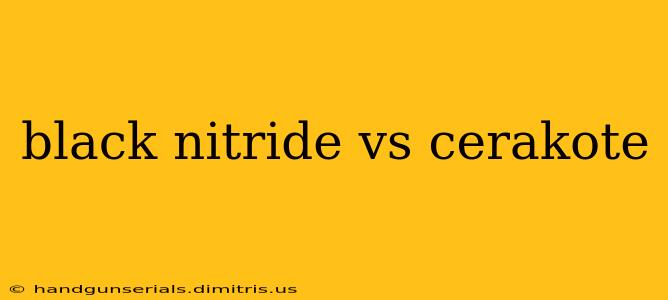Choosing the right finish for your firearm or other high-wear item can significantly impact its lifespan and performance. Two popular options frequently debated are black nitride and Cerakote. Both offer excellent protection against corrosion and wear, but they differ significantly in their application, properties, and overall cost. This detailed comparison will help you determine which finish best suits your needs.
Understanding Black Nitride
Black nitride is a conversion coating, meaning it chemically alters the surface of the metal itself. This process involves immersing the metal part in a heated salt bath containing nitrogen. The nitrogen atoms fuse with the metal's surface, creating a hard, durable layer that is integral to the base material. This results in a finish that is exceptionally resistant to wear, abrasion, and corrosion.
Advantages of Black Nitride:
- Exceptional Hardness and Durability: Black nitride boasts significantly higher hardness than many other finishes, offering superior protection against scratches and wear.
- Superior Corrosion Resistance: The chemical bonding process ensures excellent protection against rust and corrosion, even in harsh environments.
- Low Friction: The smooth surface of black nitride reduces friction, leading to smoother operation of moving parts in firearms.
- Improved Lubricity: Black nitride can enhance the retention of lubricants, contributing to smoother action and reduced wear.
Disadvantages of Black Nitride:
- Limited Color Options: Black nitride is primarily available in black, though variations in shade may exist.
- Thickness Limitations: The nitride layer is relatively thin, limiting its ability to repair significant surface damage.
- Potential for Hydrogen Embrittlement (in certain steels): Although rare with modern processes, hydrogen embrittlement can occur if the process isn't precisely controlled. Reputable applicators mitigate this risk.
Delving into Cerakote
Cerakote, on the other hand, is a ceramic-based coating applied as a liquid and then cured. It's a polymer-ceramic composite that's sprayed onto the surface of the metal. This allows for a much thicker coating and greater design flexibility compared to black nitride.
Advantages of Cerakote:
- Wide Range of Colors and Finishes: Cerakote offers an extensive palette of colors, textures, and finishes, enabling customization options beyond what's possible with black nitride.
- Thicker Coating: The thicker coating provides better protection against scratches, abrasion, and even minor impacts.
- Ability to Cover Defects: Cerakote can effectively fill minor surface imperfections, improving the overall appearance and possibly even the structural integrity in some cases.
- Versatile Application: Cerakote can be applied to a wider range of materials beyond just metals, including plastics and polymers.
Disadvantages of Cerakote:
- Lower Hardness Compared to Black Nitride: While durable, Cerakote is generally not as hard as black nitride, making it more susceptible to scratches and abrasion.
- More Prone to Chipping: The thicker layer can be more prone to chipping under extreme impact.
- Cost: Cerakote typically costs more than black nitride due to the more complex application process.
Black Nitride vs. Cerakote: The Verdict
The "best" finish depends entirely on your priorities and intended application.
- Choose Black Nitride for: Firearms requiring maximum hardness, corrosion resistance, and low friction, particularly in high-stress applications where durability is paramount. Cost-effectiveness is also a significant advantage.
- Choose Cerakote for: Firearms or other items where aesthetics and customization are important. It's ideal for situations needing a thicker, more protective layer for scratch resistance or filling minor surface imperfections. Consider it when a wider range of colors and finishes is desired.
This detailed comparison should help you make an informed decision about which finish—black nitride or Cerakote—is the best fit for your specific requirements. Remember to always consult with a reputable applicator experienced in both finishes to ensure proper application and optimal results.

